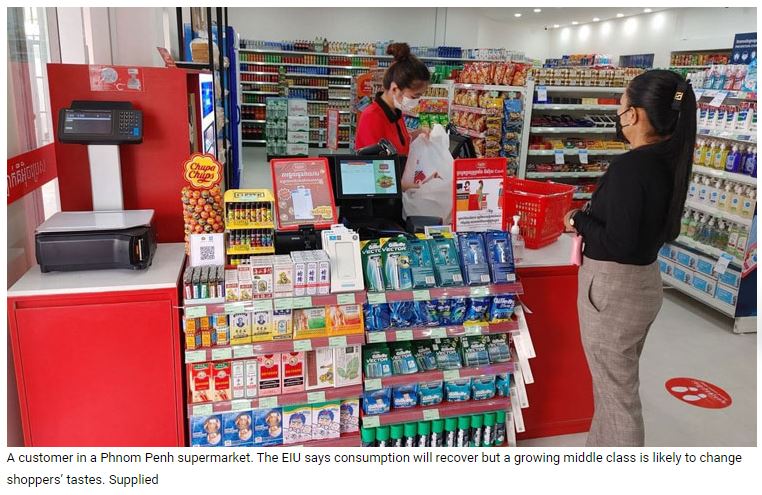Cambodia: Digitalisation and regional supply chains to grow as region recovers, EIU says
Southeast-Asia’s recovery will be uneven due to the varying pace of vaccination campaigns and a slow recovery in tourism, according to the Economist Intelligence Unit.
The EIU’s regional director William Thomas said the pandemic has also resulted in a permanent move towards digitalisation and the increasing importance of regional supply chains.
Cambodia’s vaccination campaign has exceeded EIU forecasts. In its third-quarter estimate it said the Kingdom would most likely achieve full vaccination by the second-quarter of next year. In fact the Kingdom has now double vaccinated nearly 88 percent of the population. Although that has allowed the country to allow fully-vaccinated travellers to visit again without quarantine Thomas says the recovery in tourism will be slow.
And as Asian nations return to business under the ‘new normal’ Thomas says inflation is a risk.
“As we’ve gone through this crisis governments have put in a lot of money trying to keep their economies afloat and there’s concern that all that money that’s moved into the economy is suddenly going to be unleashed as consumer demand explodes once countries reopen again. At the same time prices are still going up, in part because of the cost of supplies and the cost of transportation and limited manufacturing in countries that are still experiencing safe distancing requirements,” he said. The EIU forecasts a spike in inflation in Asia but says price rises will settle down next year.
As for the move to online shopping, banking and bill paying, Thomas say that won’t go away.
“For many years a lot of companies have talked about digital transformation. They haven’t necessarily done it. In 2020 they didn’t have much choice as people started working from home, business travel shut down, as consumers didn’t go to physical stores anymore, a lot of digital tools came into play,” he said. “As we reach the end of the pandemic do we expect to see that go away? Do we expect a U-turn on technology? The answer to that is a very adamant no. We are well down the path of digital transformation and the tools that companies are using have been embedded into the processes. Organisations have made the investments and they’re not likely to back off. On the consumer side customers have got very used to the idea of online shopping or customer service through AI or digital payments or other use of digital tools that provide convenience that they are simply not going to give up.”
Cambodia is a signatory to the Regional Comprehensive Economic Partnership, which comes into force on January 1 next year. That will increase the growth of regional supply chains and intra-Asian trade after Covid-related disruptions slowed trade with Europe and North America and pushed up transportation costs.
“One of the impacts in changes in manufacturing is going to be changes in supply chains. Something that has emerged over the last year and a half is a growing recognition of all the vulnerabilities that companies and countries face in their global supply chains,” he said. “While the pandemic has certainly created a lot of problems it has also shined a light on a lot of other vulnerabilities: situations such as political problems or technological issues such as a ship getting stuck in the Suez Canal, things over which countries here have no control. We’re seeing companies look to expand their manufacturing around Southeast-Asia to regionalise their supply chain and as we see the RCEP come into force in 2022 and beyond that’s going to facilitate the growth of a more regional supply chain here in Asia.”
The other major factor to watch is the growing influence of China, Thomas said, since the United States has cut back on investment, trade deals and diplomacy in the region.
“When you talk about business in Asia you really can’t do that without talking about China. China has been increasing its international presence over the last few years in absolute terms but also relative to the United States. The US has lost its influence in Asia. It is not a party to the major trade agreements here such as the RCEP and the CPTPP. There have been too many US embassies without ambassadors for the last few years and frankly the US has stepped back a bit from Asia leaving a gap for China instead. China has also taken opportunities to expand the Belt and Road initiative to include a health BRI and a digital BRI in addition to the physical infrastructure and its very engaged in vaccine diplomacy providing vaccines to countries around Southeast-Asia.”
For emerging markets such as Cambodia Thomas said a growing middle class will increase consumption and change spending patterns as shoppers choose quality over price. While consumption slowed during the pandemic, he forecast a return to stronger spending and increasing demand for imported products.
Source: https://www.khmertimeskh.com/50985123/digitalisation-and-regional-supply-chains-to-grow-as-region-recovers-eiu-says/


 English
English




